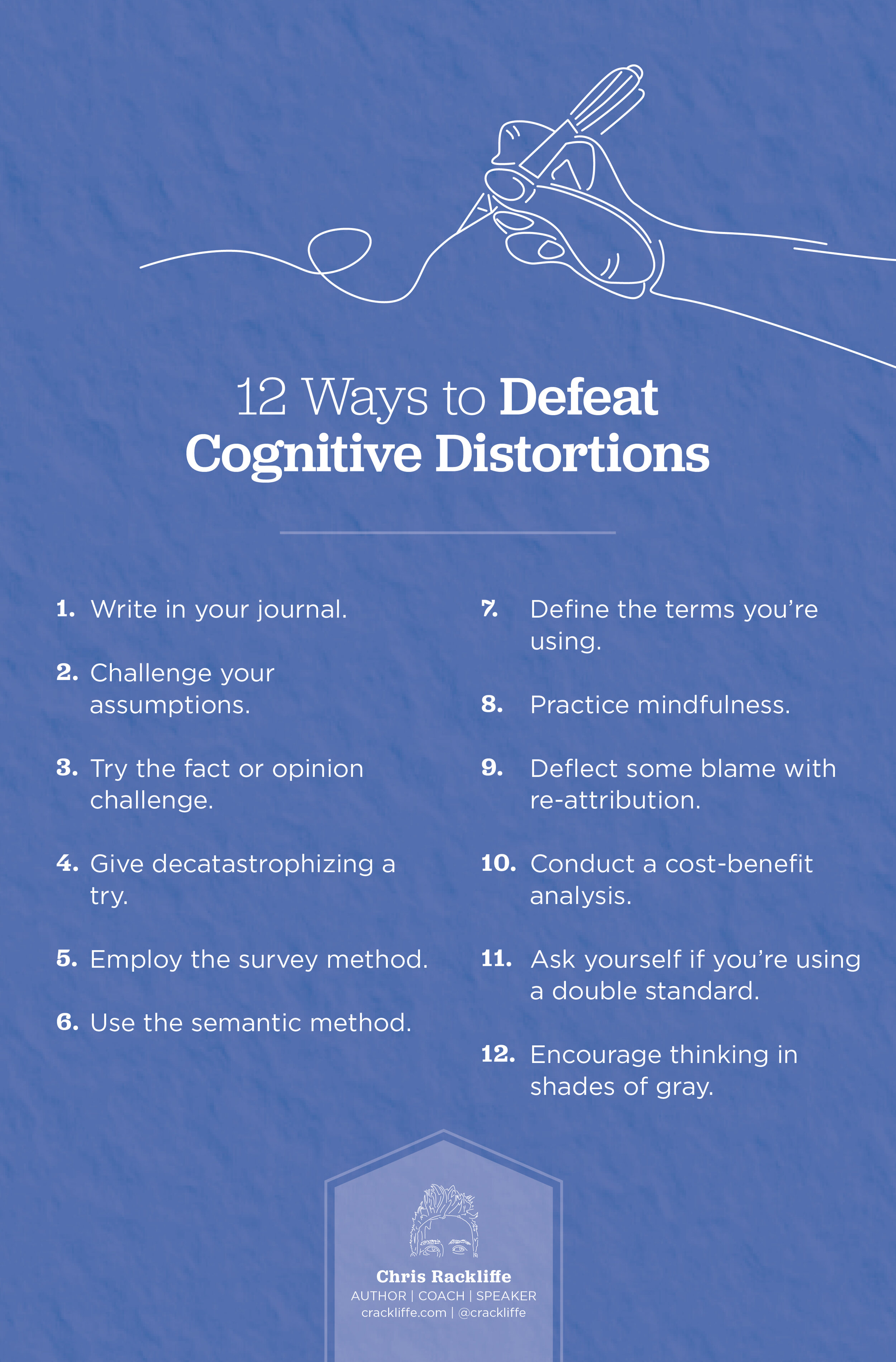
Mental Distortions That Are Sabotaging Your Social Life
Written: editor | July 3, 2023

Cognitive Distortions
Recognizing and addressing cognitive distortions in social interactions
Recognizing and addressing cognitive distortions in your social interactions is key to improving your social life. Cognitive distortions are irrational thoughts or beliefs that can negatively impact how you perceive and interact with others. Here are some common examples:
-
Mind Reading: Assuming you know what others are thinking without any evidence. This can lead to misinterpretations and misunderstandings.
-
Negative Filtering: Focusing only on the negative aspects of a situation or person, ignoring the positive. This can lead to feelings of pessimism and isolation.
-
Personalization: Taking things personally and assuming that everything others say or do is about you. This can lead to unnecessary self-blame and insecurity.
Challenging negative thoughts and beliefs
Challenging negative thoughts and beliefs is essential in overcoming cognitive distortions. Here are some strategies to help you do so:
-
Reality Testing: Evaluate the evidence for your thoughts and beliefs. Are they based on facts or assumptions?
-
Alternative Explanations: Consider alternative explanations for a situation or person's behavior. Is there another interpretation that is more positive or neutral?
-
Reframing: Replace negative thoughts with more objective and realistic ones. Focus on the evidence and challenge your own negative biases.
By recognizing and challenging cognitive distortions, you can develop healthier and more positive social interactions. Seeking professional help, such as cognitive-behavioral therapy, can also provide additional support in addressing these distortions and improving your social life.

Social Anxiety
Exploring social anxiety and its effects on social life
If you find yourself feeling anxious or uncomfortable in social situations, you may be dealing with social anxiety. Social anxiety is a common mental health condition that can greatly impact your social life, making it difficult to interact with others and participate in social activities. It often involves excessive fear of being judged, embarrassed, or humiliated in social settings.
The effects of social anxiety on your social life can be significant. It may prevent you from attending social events, meeting new people, or speaking up in group settings. It can also lead to feelings of isolation, loneliness, and low self-esteem.
Coping strategies for managing social anxiety
The good news is that there are effective coping strategies you can employ to manage social anxiety. Here are a few techniques that you can try:
-
Challenge your negative thoughts: Social anxiety is often fueled by negative self-talk and distorted thinking patterns. Practice challenging your negative thoughts and replacing them with more realistic and positive ones.
-
Practice gradual exposure: Gradually expose yourself to social situations that make you anxious. Start by engaging in low-stress social activities and gradually work your way up to more challenging situations.
-
Seek support: Reach out to friends, family, or a therapist who can provide understanding, guidance, and support. Talking about your anxieties with others can help alleviate the burden and provide different perspectives.
-
Learn relaxation techniques: Practice relaxation techniques such as deep breathing, meditation, or progressive muscle relaxation. These techniques can help reduce anxiety symptoms and promote a sense of calm.
Remember, overcoming social anxiety takes time and practice. Be patient with yourself and celebrate small victories along the way. With the right strategies and support, you can manage social anxiety and improve your social life.

Introduction
When it comes to your social life, you may find yourself facing mental distortions that can sabotage your interactions with others. One common distortion is perfectionism, which can lead to unrealistic expectations and hinder your ability to connect with people.
How perfectionism can hinder social interactions
-
Fear of judgment: Perfectionists often worry about being judged by others, which can make them hesitant to engage in social situations. This fear can prevent you from forming new relationships or joining social activities.
-
High standards for self and others: Perfectionists may set high standards for themselves and expect the same from others. This can lead to disappointment, frustration, and strained relationships when these expectations are not met.
-
Difficulty expressing vulnerability: Perfectionists tend to avoid showing vulnerability or making mistakes, fearing it will tarnish their image. This unwillingness to be vulnerable can hinder genuine connections and prevent others from truly getting to know you.
Overcoming perfectionism and embracing imperfection
-
Challenge your perfectionist thoughts: Recognize that perfectionism is an unrealistic and unattainable goal. Practice reframing negative thoughts and setting more realistic expectations for yourself and others.
-
Practice self-compassion: Embrace self-acceptance and treat yourself with kindness and understanding. Remember that everyone makes mistakes and that imperfections are a natural part of being human.
-
Seek support: Consider talking to a therapist or joining a support group to help you navigate and overcome perfectionistic tendencies. They can provide guidance and strategies for building healthier social connections.
Taking steps to overcome perfectionism allows you to cultivate more authentic and meaningful social relationships. Embracing imperfection and being more accepting of yourself and others can lead to greater happiness and satisfaction in your social interactions.

Negative Self-Talk
Identifying negative self-talk patterns in social situations
When it comes to social interactions, negative self-talk can greatly sabotage your social life. It is important to identify and address these mental distortions in order to improve your social experiences.
One common mental distortion is “mind reading,” where you assume that you know what others are thinking about you. This can lead to self-doubt and anxiety, making it difficult to engage with others. Another distortion is “catastrophizing,” where you exaggerate the potential negative outcomes of social situations. This can prevent you from taking risks and trying new things.
Replacing negative self-talk with positive affirmations
To overcome these mental distortions, it is important to replace negative self-talk with positive affirmations. Start by becoming aware of your negative thoughts and challenging their validity. Ask yourself if there is any evidence to support these thoughts or if they are simply assumptions.
Next, reframe your negative thoughts into positive affirmations. For example, if you catch yourself thinking, “I always say the wrong things,” rephrase it as, “I am an interesting and engaging conversationalist.”
Practice these positive affirmations regularly to reinforce positive self-talk and build confidence in social situations. Surround yourself with supportive and positive people who can help validate your worth and abilities.
Remember, improving your social life takes time and effort. By recognizing and addressing negative self-talk patterns, you can start building healthier and more fulfilling social connections.

Fear of Rejection
Understanding the fear of rejection and its influence on social interactions
When it comes to social interactions, one of the most common mental distortions that can sabotage your social life is the fear of rejection. This fear often manifests as anxiety, self-doubt, and a reluctance to put oneself out there in social situations. It can lead to missed opportunities for meaningful connections and a decreased quality of social life.
The fear of rejection is rooted in a deep-seated need for acceptance and a fear of being judged or ostracized by others. This fear can result in avoidance behaviors, such as avoiding social events or not expressing oneself authentically, for fear of being rejected or misunderstood.
Building resilience and self-confidence in the face of rejection
Overcoming the fear of rejection requires building resilience and self-confidence. Here are some strategies to help you navigate and overcome this fear:
-
Challenge negative thoughts: Recognize that rejection is a part of life and does not define your worth as a person. Challenge negative thoughts and replace them with more positive and realistic ones.
-
Practice self-compassion: Be kind to yourself and recognize that everyone experiences rejection at some point. Treat yourself with the same kindness and understanding that you would offer a close friend in a similar situation.
-
Take small steps: Start by putting yourself in low-risk social situations and gradually work your way up to more challenging ones. This gradual exposure can help build resilience and boost your confidence.
-
Seek support: Reach out to trusted friends, family members, or a therapist who can provide guidance and support as you work through your fear of rejection.
Remember, overcoming the fear of rejection takes time and practice. By challenging negative thoughts, practicing self-compassion, taking small steps, and seeking support, you can gradually overcome this fear and improve your social interactions.

People-Pleasing
Breaking the cycle of people-pleasing and setting healthy boundaries
Are you constantly putting other people's needs before your own? This constant need to please others can take a toll on your social life. It's important to break the cycle of people-pleasing and set healthy boundaries for yourself. Here are some tips to help you navigate this:
-
Identify your own needs: Take the time to understand what you truly want and need in your social interactions. This will allow you to set boundaries that prioritize your well-being.
-
Learn to say no: It can be challenging, but saying no is a crucial step in establishing healthy boundaries. Remember, you are not obligated to say yes to every request or invitation.
-
Communicate your boundaries: Let others know about your limits and preferences. Clearly expressing your boundaries will help others understand and respect your needs.
Developing authentic connections and self-acceptance
Building authentic connections with others starts with accepting yourself as you are. Here's how you can enhance your social life by developing self-acceptance:
-
Embrace your uniqueness: Recognize and celebrate your individuality. Embracing your strengths, quirks, and imperfections will allow you to show up authentically in your social interactions.
-
Practice self-compassion: Be kind to yourself and treat yourself with the same understanding and forgiveness you extend to others. This will help boost your self-esteem and create a positive impact on your social connections.
-
Engage in activities that align with your values: Pursue hobbies and engage in activities that resonate with your passions and values. This will attract like-minded individuals and foster genuine connections.
Remember, breaking free from mental distortions like people-pleasing and developing self-acceptance takes time and effort. Be patient with yourself and celebrate every small step towards a healthier social life.

Comparison and Envy
The pitfalls of comparing yourself to others and experiencing envy
Comparing yourself to others and experiencing envy can sabotage your social life by creating feelings of inadequacy, low self-esteem, and resentment. Constantly measuring yourself against others' success or happiness can lead to a negative mindset and a distorted perception of your own life. This can hinder your ability to form meaningful connections and enjoy social interactions. Envy can breed unhealthy competition, jealousy, and even hostility, ultimately damaging relationships and causing isolation. It's important to recognize this mental distortion and shift your focus towards personal growth and self-acceptance.
Cultivating gratitude and celebrating individual achievements
To overcome the pitfalls of comparison and envy, cultivate gratitude and celebrate your own achievements. Practice gratitude by acknowledging the positive aspects of your life and appreciating what you have rather than focusing on what others possess. By shifting your mindset to one of gratitude, you can foster contentment and fulfillment, which will positively impact your social interactions. Celebrating your own achievements allows you to recognize your unique talents and strengths, boosting your self-confidence and empowering you to connect with others authentically. Remember that everyone has their own journey and comparing yourself to others only hinders your own personal growth. Instead, focus on your own progress and celebrate the successes of others in a genuine and supportive manner.

Conclusion
In order to foster healthier social connections, it is important to recognize and address any mental distortions that may be sabotaging your social life. By taking proactive steps and seeking support when needed, you can overcome these distortions and develop stronger relationships with others. It is also important to understand common misconceptions about mental distortions in order to avoid falling into their traps. Remember, you have the power to change your mindset and create meaningful connections with others.
Taking steps towards overcoming mental distortions and fostering healthier social connections
-
Self-awareness: Start by identifying and acknowledging any negative thought patterns or biases that may be affecting your social interactions. Journaling or therapy can be helpful in gaining self-awareness.
-
Cognitive restructuring: Challenge and replace negative thoughts or distorted beliefs with more rational and positive ones. Practice reframing situations to see them in a more balanced and realistic light.
-
Social skills training: Improve your social skills through practice and seeking feedback from trusted friends or mentors. Communication skills, active listening, and empathy can enhance your interactions with others.
Seeking professional help and support if needed
If mental distortions are significantly impacting your social life, it may be beneficial to seek professional help. Therapists and counselors can provide guidance, support, and techniques to address and manage distorted thinking patterns.
Common misconceptions about mental distortions
-
Weakness or personal fault: Mental distortions are not a sign of weakness or personal failure. They are common and can affect anyone.
-
Permanent and unchangeable: Mental distortions can be overcome with self-reflection, self-care, and therapy. They do not have to define your social interactions indefinitely.
-
Shame or stigma: Seeking help for mental distortions is a courageous and proactive step towards personal growth and healthier relationships. There is no shame in asking for support when needed.



